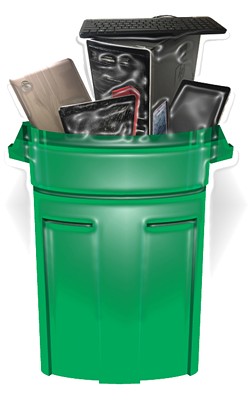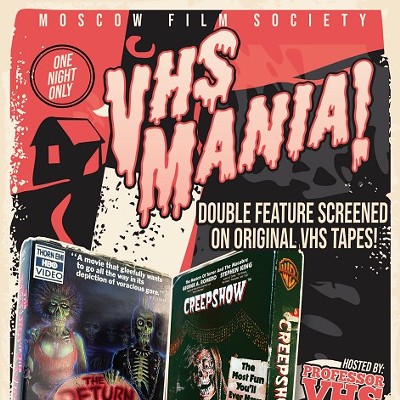If your family’s Christmas was like ours, there were some shiny new electronics that replaced smaller, slower, less-cool models.
Of course, the new stuff got set up right away, but now it’s time to deal with the pile of items that got replaced.
Most of us know electronic waste -- or e-waste -- doesn’t belong in the garbage. But where does it belong? I gathered our out-dated, unwanted or non-functional electronics from their various nooks and crannies and decided to find out. The options are always changing, but here are a few that are currently available in the area:
Resale
Ideal for: newer, working electronics that have value and newer phones or tablets that need repair
Last summer our iPad Air met an early demise when it met abruptly with a tile floor. The screen was completely shattered, and repair cost as much as replacement. It has been sitting around ever since.
I looked around online and found that newer tablets and phones -- even broken ones -- can often be resold or traded for store credit. Glyde.com offered to give me the best price for my device in its condition, so I signed up, listed it for sale and two hours later I got a message that I had a buyer. I confirmed the sale, received a pre-paid shipping box a few days later and after it was received, I got $54. It was surprisingly simple and painless.
Newer, working items can also be sold directly to a local buyer through online or newspaper classifieds. But of course, the potential hassle of flaky buyers is part of what you get paid for.
Don’t wait - The longer you wait to part with your electronics, the fewer your options will be. Electronics lose value quickly, so you’re losing money by letting your old phone or television sit around before reselling. Similarly, items that can be reused or donated are more desirable the sooner you pass them on.Reuse
Ideal for: working, slightly outdated electronics
I always hate to part with items that are still usable, even if I no longer want to be that user. I’ve got a glitchy laptop and slow desktop computer that technically still work, but I don’t have the skills to clean them up and give them newer, faster guts.
For me and others in that spot, Lewis Clark Recyclers Inc. in Lewiston is a Microsoft registered refurbisher that offers a refurbishing program for computers and other devices that meet certain system requirements. My laptop and desktop might make the cut. I paid $19.95 for certified data destruction for the laptop (see more information in the sidebar); for the desktop, we removed and kept the hard drive for reuse. I didn’t get money for either of them, but I did get warm fuzzies knowing they might get a second life with someone else -- and that’s something, right? These refurbished items are offered for discounted prices at Lewis Clark Recyclers.
Thar’s gold in them thar landfills - Your electronic devices contain precious metals like gold and silver. Throwing these away fills a landfill with valuables and increases the cost of future electronics because it makes these resources harder to get.Donate
Ideal for: newer and slightly outdated working electronics
It’s always nice to think your old stuff can benefit someone else, but that’s a tough ask for old electronics. Without a centralized database of items needed by local nonprofits or individuals, it takes a bit of luck to match your item with a need. The YWCA in Lewiston accepts used, working cellphones, which are made available to women using their services. Goodwill in Moscow and Lewiston accept working TVs and computers, but Salvation Army in Lewiston doesn’t. I would have considered donating my old desktop computer -- it still works and someone could use it -- but there’s data on that hard drive that will be tough to remove and, for me, it isn’t worth the risk.
Small space, big impact - Electronic waste comprises only 2 percent of landfill waste -- but it’s responsible for around 80 percent of toxins that are subsequently released into the air and water supply.Recycle
Ideal for: all electronic devices
We’ve had an original iPad sitting around for years that was outdated from the moment we opened the box. (Come on, Apple, how could you have forgotten to install a camera?) It was never able to make it past iOS 5 and is useless except as a hot pad -- it’s truly the unwanted orphan of the digital era. Fortunately, it can at least be broken down and recycled into a future electronic device.
Electronics with nowhere to go can always be recycled, you just have to find the best option for where you live. Being a responsible recycler means taking it to someone who will actually break down the components to sell for reuse. If you want to make sure your items aren’t piled high and abandoned in a warehouse or shipped as garbage to other countries, be sure your recycler is the real deal.
Lewis Clark Recyclers accepts all electronic devices and associated peripherals -- except TVs and CRT monitors -- for free from anyone. Flatscreen monitors are accepted but will cost you $10 each. Items can be dropped off at their location; open from 9 a.m. - 5 p.m. Tuesday through Friday, with Saturday hours by request.
Moscow Recyclers accepts most types of electronic waste, which can be dropped off from 9:30 a.m. - 5:30 p.m. Tuesday through Saturday. Collection is free to Latah County residents and for a small fee from non-residents.
The state of Washington participates in an e-cycle program that is funded by electronics manufacturers. The program provides collection sites for electronics including TVs, desktop and laptop computers, e-readers, tablets and more. Both Pullman Disposal in Pullman and the Asotin County Landfill in Clarkston accept these items. Visit www.ecyclewashington.org to find other nearby locations.
Pullman Disposal also accepts other types of e-waste not covered by the state program at a cost of 50 cents per pound. It purchases cellphones for 6 cents per ounce. E-waste is collected from 11 a.m. - 4 p.m. Monday through Friday.
Staples in Moscow and Lewiston also collects certain types of e-waste for recycling. Check with the store for details.
Data Destruction
If you’ve purchased items online or kept financial records, that information is stored on your hard drive and can be accessed by someone else if you don’t take care of it. Simply deleting files or reformatting your computer does not necessarily destroy that data. If you want to protect that information, consider the following solutions:
The hammer: The cheapest way to protect your data is to pull out your hard drive and take a hammer to it until it’s so bent up that no one could pull anything off. This works well if you know what a hard drive is and how to pull it out. Pent-up aggression helps too.
DIY scrubbing: Free data protection programs can be downloaded and used to wipe your hard drive. This is an advanced procedure that requires you to run a program without booting up your operating system.
Professional data destruction: Take your computer to a secure, professional data destruction location. Moscow Recyclers provides free data protection for all items dropped off at its location. Items are secured and sent to Recycle Boise, which is certified to protect data. Lewis Clark Recyclers provides data destruction for $19.95 an item. They’ve developed a proprietary method of scrubbing and data is destroyed on site.
Factory resets for tablets, phones and other devices: Some electronic devices have simple steps to wipe personal data. Follow manufacturer instructions before selling or giving away your device.























